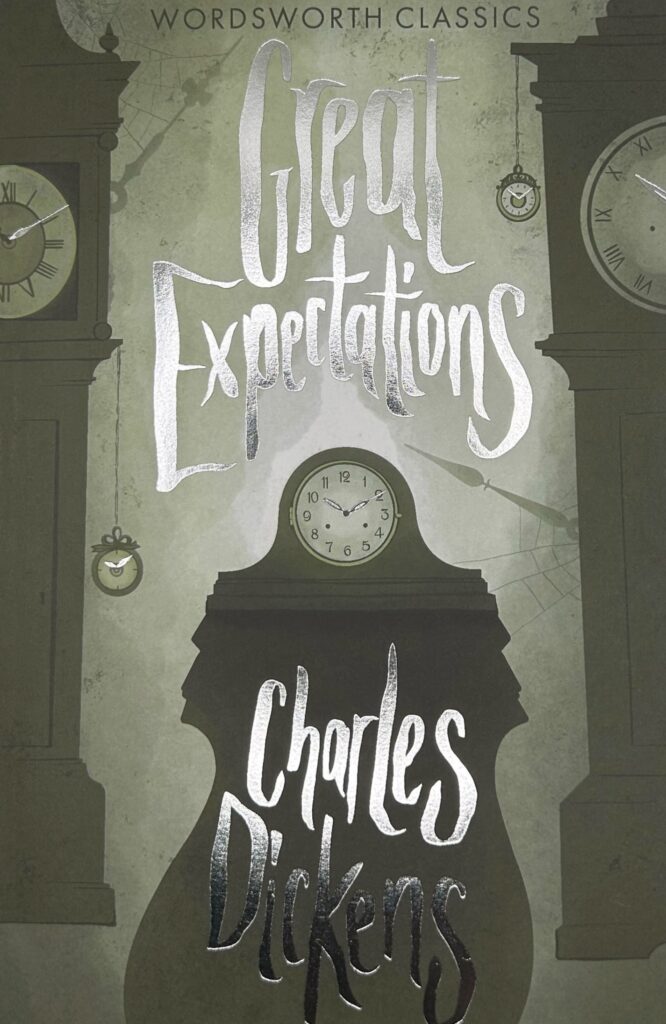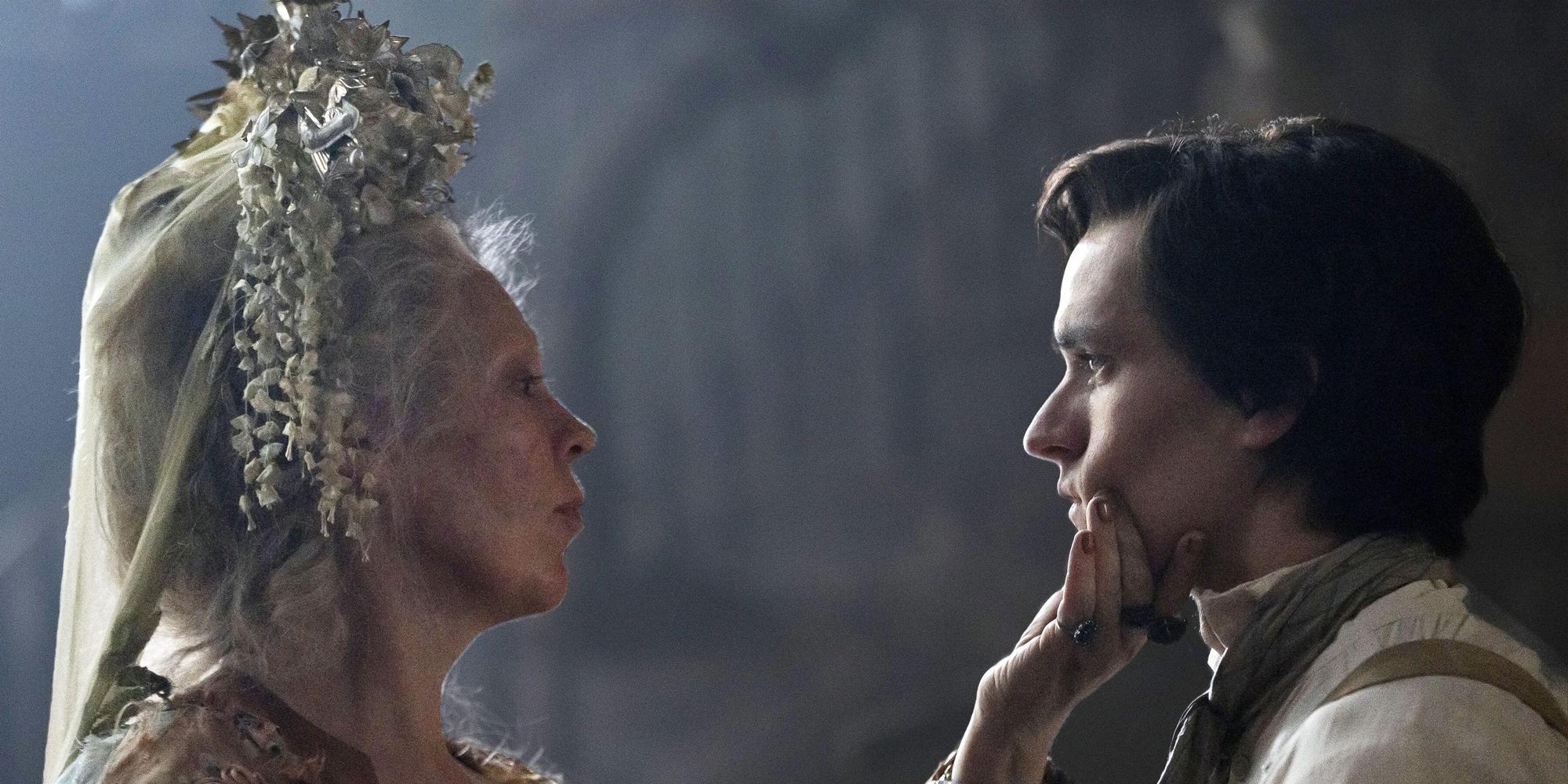
Great Expectations: reduced imaginations
Sally Minogue and Stephen Carver give a final overview of the BBC One adaptation of Dickens’s novel.
The first episode of Steven Knight’s adaptation of Great Expectations was a pleasant surprise to both Stephen Carver and me. Stephen will speak in the later part of this blog; but for both of us, I think, this seemed a faithful and atmospheric opening, against the howls of protest from reviewers who had seen the whole serial in one go. At the time I tweeted, ‘give it a chance!’ Well – I gave it a chance, and I really didn’t want to have any pre-disposed reactions to the elements highlighted in the reviews. Colour-blind casting – been done before and it works; a use of the street language of the day (the much commented-on ‘fucking’ intensifier) – justifiable on grounds of realism and a changed set of boundaries regarding ‘bad’ language on television; bringing in contemporary questioning of Empire – yes, yes, yes, if done intelligently. But for me the areas where the lack of fidelity to the original mattered were not in these (arguably) anachronistic elements, but in the alteration of character and narrative. Surely the whole point of the television/film medium we have available to us today is that it has the capacity to conjure worlds beyond the capability of the written word? But having that capacity doesn’t make it so. Knight has done the unforgivable, with a novel of complex and expansive imagination, and even more complex story-telling. By his overuse of sensation at the expense of nuance, he has made it dull.
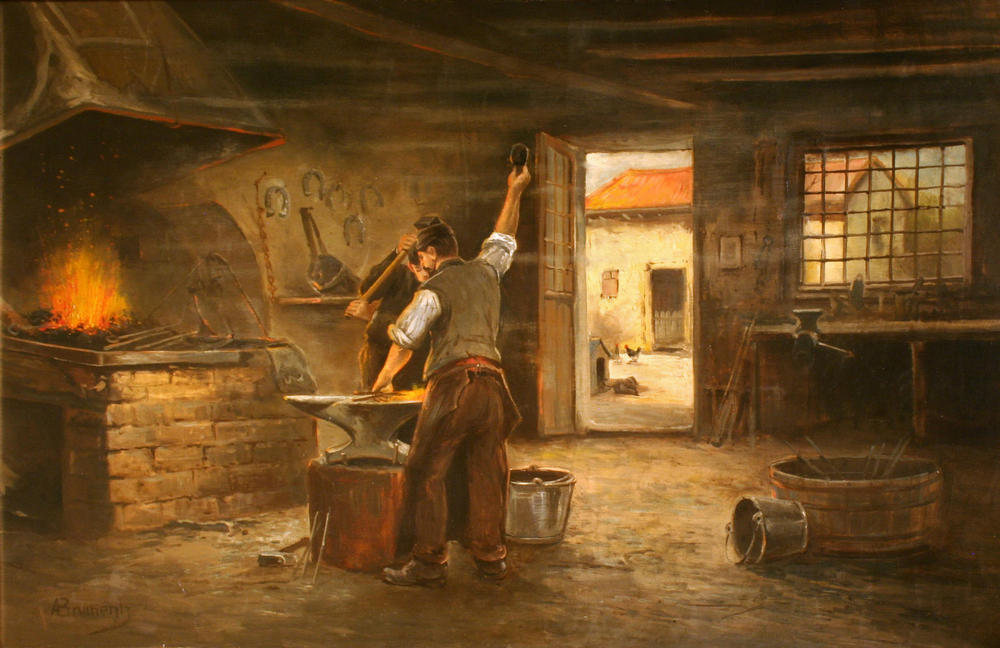
The Blacksmith’s Studio
Let’s take as examples the representation of two of the central characters, Miss Havisham and Joe Gargery. In the novel, as is often the case with Dickens, both are exaggerated. Joe is an uneducated man, but a skilled one, being a blacksmith. Dickens emphasises his simplicity by representing his language and understanding as limited at times, through repeated tropes of speech – “what larks” and “always the best of friends” are his main means of expressing his love to Pip. Miss Havisham is the disappointed woman so sickened, so humiliated that her only satisfaction is through an inverted revenge. Instead of speech we have the representative symbols of her petrification: the mouldering wedding cake, the decaying wedding dress. So here we have a man who is uncomplicatedly good, and a woman twisted through what has happened to her into being bad. But in the fiction each is represented differently. Joe, in spite of his mistreatment by his wife, looks on the world benevolently; he is inherently a good person, and he lives his life accordingly. He loves Pip unconditionally, and he defends his wife in spite of the fury she directs against him. The subtext is that he understands that fury. Joe always stays the same, but only because he has already long arrived at a point of great goodness. Miss Havisham by contrast is frozen at the moment of her extreme disappointment and humiliation; she cannot live her life at all, she can only stay fixed in that moment. Any satisfaction she gets is from twisting the lives of others as hers has been twisted. Where Joe has no need to move or change, Miss Havisham is unable to. In the novel the two act in parallel, and Pip is caught between them as his guiding principles. But whereas with Miss Havisham there is barely, and deliberately, any sense of an inner life, with Joe we have numerous examples of his inner understanding, both moral and emotional, even if these are expressed in simple terms.
In the adaptation, the balance between the representation of the two is crucially altered. The front and centre of Joe as a character is his through-and-through goodness. This, and his unerring, unconditional love for Pip, act as a lodestone to Pip from his earliest days. It is that which tugs at Pip at key points in his struggle with his own ambitions, his shame regarding his lowly origins, and his embarrassment about Joe. That struggle is entirely missing from the adaptation. Instead of Joe’s tutelage of Pip as his apprentice blacksmith from 14 to 18, we see Pip rather as Miss Havisham’s apprentice, learning to be a ‘gentleman’. We thus miss both the point that it is his mysterious benefaction that breeds that desire and furnishes the opportunity, and the fact that Joe is the real source of any hope he may have of being a proper and a good man, rather than a gentleman. The adapters were no doubt seeking to avoid a working class stereotype in Joe – the simple common man. But in doing so they fatally reduce him to being neither good nor common! Instead we have a horrible echo of the eye candy moment in Poldark, as Joe strips off at the forge, apparently taking out his jealousy on a molten horseshoe – indicating that he allows Mrs Joe to satisfy Pumblechook’s masochistic urges in exchange for financial favours. Yet there is example after example in the novel of Joe’s complete financial straightness, which goes with his human and moral probity. He sees that if monetary exchange is involved, human relations are necessarily corrupted. When Pip comes into his expectations, Mr. Jaggers, ‘swinging his purse’, checks whether Joe requires payment:
“The question is, Would you want anything? Do you want anything?”
“The answer is,” returned Joe sternly, “No.”
When Jaggers reiterates the offer of ‘compensation’, Pip recalls, ‘Joe laid his hand upon my shoulder with the touch of a woman. I have often thought of him since, like the steam-hammer, that can crush a man or pat an eggshell, in his combination of strength with gentleness’. There can be no compensation to him for the loss of Pip; with the trueness of love, he lets him go.
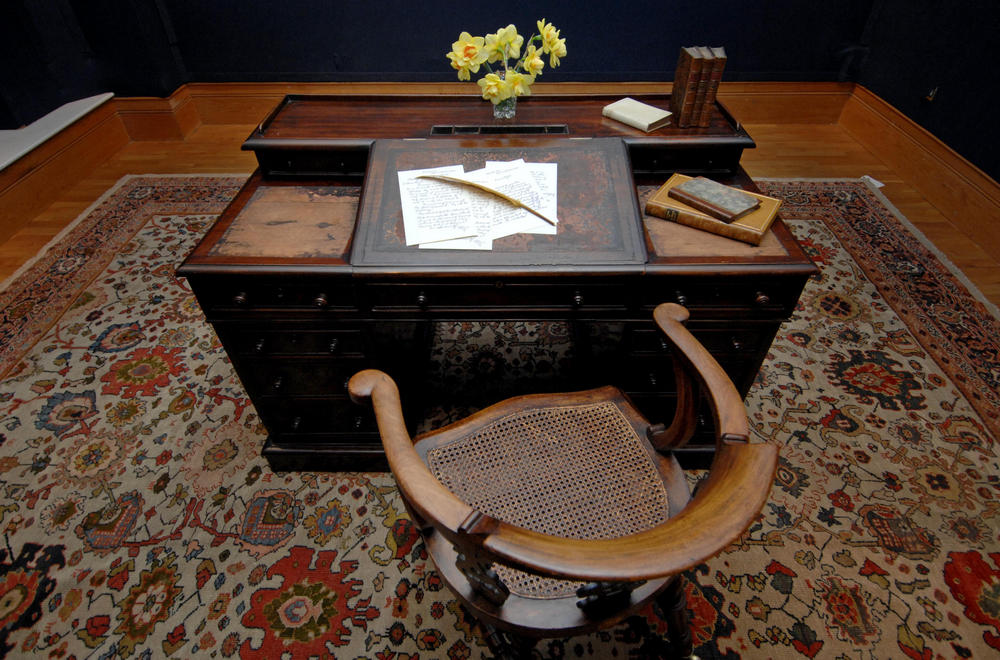
Dickens’ writing desk and chair
Meanwhile, in the adaptation, over at Satis House Miss Havisham is getting her implied sexual satisfaction by a blindfold game between Pip and Estella, then graduating to a further level of voyeurism by thrusting Pip, absurdly, into the arms of a local church-going woman, free with her favours, a stereotype if ever there was one. The Pip of the novel would undoubtedly have politely refused her favours and spent the hour – talking. Here we have him smirking at her in church after their supposed congress. I think the adapters missed a trick here. If the sexual liaison had been arranged between Pip and Estella, this would have made some sense, fleshing out literally Pip’s lifelong captivity. It would have made sense to a modern audience and in a modern adaptation: fucking rather than ‘fucking’. But the adapters lacked that sort of courage.
So what is centrally missing in the adaptation is Pip’s inherent innocence, however hidden; without that, there is no sense to the struggles he has with his own selfish and base instincts. Instead, the adaptation shows him corrupted by Miss Havisham at a very early stage by making their exchange commercial. She pays him for his visits. This is profoundly mistaken: the whole point in the novel is that she doesn’t pay him. His only payment is to be chosen. The one payment she does make is omitted by Knight: she finances Pip’s indentures with Joe, and in doing so she also pays him off, making it clear he will have no more from her. His mysterious benefaction comes four years later.
In the novel, understandably, Pip immediately thinks that comes from Miss Havisham; but Dickens maintains a narrative ambiguity throughout, so that the reader is never sure, various hints being dropped in other directions. In the adaptation, those narrative uncertainties are closed down; anyone watching up to episode 4 would assume Miss Havisham is the benefactor.
Jaggers’ rampagingly evil role (miles away from the novel) finally bulldozes any moral, emotional or narrative ambiguity, as he deliberately leads Pip further and further into the mire, with but an occasional quiver of the young lip to indicate a doubt – almost immediately squashed. Jaggers instructs Pip in corruption of the worst sort, heavy-handedly implying that that is what being a gentleman is. The point of the novel’s far more complex narrative is that Pip corrupts himself. It’s a deeper and more personal dereliction; but it allows for an equally personal remorse and redemption, connected to the loving Joe. Again, the process of that remorseful self-discovery is missing from the adaptation, since Pip’s near-fatal illness and Joe’s tender nursing of him are entirely omitted. This makes his final return to the life of the forge, to become a second ‘Joe’, a reduction rather than a redemption.
Sally Minogue
*****
On the conclusion of Steven Knight’s loose adaptation of Great Expectations, I was reminded of a couple of things from Dickens. The first was Mr. Curdle from Nicholas Nickleby, who had ‘proved that by altering the received mode of punctuation, any one of Shakespeare’s plays could be made quite different, and the sense completely changed.’ (Victorian theatre troupes often gave the tragedies happy endings.) The other was John Forster’s account of going to see a stage version of Oliver Twist with Dickens, when ‘in the middle of the first scene he laid himself down upon the floor in a corner of the box and never rose from it until the drop-scene fell.’ If watching Great Expectations now, I have no doubt that Dickens would put his foot through the TV and send the BBC the bill.
When I reviewed Knight’s version of A Christmas Carol a few years ago I gave him the benefit of the doubt. It was a decent ‘re-imagining’ and at least different to all the other adaptations out there. In a more recent piece, I was also reasonably impressed with the opening episode of Great Expectations, but I have now revised my opinion. I have a lot of respect for Knight as an original screenwriter, but it’s time to get him away from Dickens before he does any more damage. Given that many people get a sense of the classics from film and TV adaptations, it pains me to think that a new generation of potential readers will instead file away Great Expectations as joyless and melodramatic Victorian crime drama rather than the beautifully realised exploration of love, humility, and redemption that constitutes the original novel.
I noted in my previous review that Olivia Colman had likened Dickensian characters to those of Shakespeare. This is a fair comparison; it is difficult in English literature to think of any authors whose work is more iconic and ingrained in the cultural landscape. And despite all the different interpretations of Shakespeare, the modern dress versions, Peter Brook’s experimental staging, Kurosawa’s samurai films, and Sons of Anarchy (Hamlet with motorcycles), the unwritten rule is that the stories remain essentially as the Bard intended. MacBeth, for example, does not cease to be MacBeth because the tragedy has been moved to feudal Japan (Throne of Blood, 1957), and Richard III loses none of its power when set in a fascist state in the 1930s like Richard Loncraine’s 1995 film starring Ian McKellen. The technique is similar to historical drama. Material may be omitted or rearranged for the sake of dramatic pacing, and some characters conflated or cut for the same reason, but key events and story arcs remain. History is history and drama is drama. They are different forms of narrative, but respect must be paid to the truth. All the various interpretations of Shakespeare would, however, no longer be ‘true’ if Banquo and MacBeth went around acting like the Kray Twins while Lady MacBeth had an affair with MacDuff, say, or if Buckingham and Clarence become lovers, the princes in the tower survived, and Richard saw the error of his ways and surrendered to Richmond. This goes beyond ‘reimagining’; when a source text is so radically altered, it becomes a new story, and probably not anywhere near as good as the original. Who among us, really, would have the temerity to rewrite Shakespeare or Dickens?
Well, Steven Knight, apparently. I have written elsewhere on this blog about all the different adaptations of the novel, but my point was that we might get off the beaten track of English literature as taught in schools and the culture industry in general, in favour of rediscovering some less-well-known Romantic and Victorian novels. Let’s blow the dust off Ainsworth and Lytton, for example, or maybe Pierce Egan, J.S. Le Fanu, Mary Braddon, Louise De La Ramée, or Harriet Martineau. Let’s mine the penny dreadfuls. Let’s adapt a Thackeray novel that isn’t Vanity Fair. Nineteenth century popular literature is a treasure trove waiting for a new generation of screenwriters and filmmakers to plunder. But that’s not what’s happening with Knight’s Great Expectations. This is just change for change’s sake, I assume to freshen up a familiar story. But as Armando Iannucci ably proved in The Personal History of David Copperfield (2019), these stories can be made new without the essence of the original being lost. I am not some purist arguing for stodgy fidelity at all cost, but I still expect a reasonable sense of the story as intended by its original author. Update it by all means, play around with it, just do it well. I think what depressed me the most about Great Expectations was how badly it was written. Some fantastic actors, mostly notably Shalom Brune-Franklin (Estella) and Ashley Thomas (Jaggers), were given very little of substance with which to work. They deserve BAFTAs for their stunning performances despite the script, but I fear the terrible plot will bury their contribution while I don’t expect another Steven Knight Dickens serial anytime soon. Critics hated it, and the viewers have voted with their feet. Even national treasure Olivia Colman could not save this one.
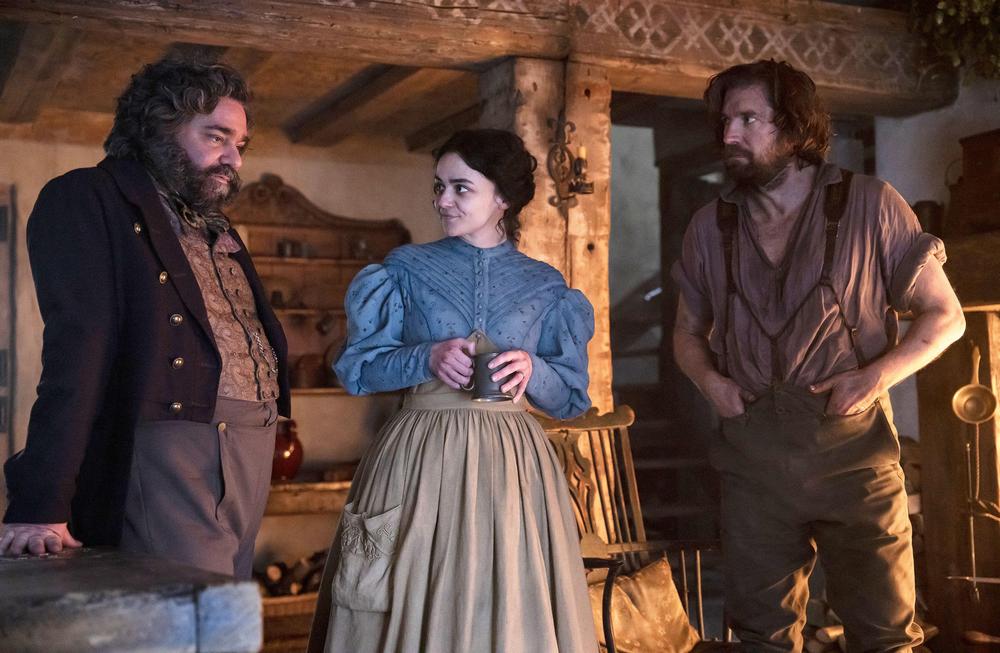
Matt Berry, Hayley Squires and Owen McDonnell.
As Sally has persuasively argued, the entire point of the original novel has been lost. Unlike his Christmas Carol, Knight seems not to have understood the heart of the story and has instead indulged in a lot of dramatic speculations. What if Miss Havisham confronted Compeyson and both were armed? What if Estella self-harmed? What if Jaggers was bad to the bone? Many of these don’t come off, or make much sense in terms of character development, after the more promising early establishing episodes. These I rather enjoyed, despite the deviation from the original novel and the two superfluous and utterly gratuitous sex scenes already noted by Sally. Pip is now an aggressive social climber, and he, Estella, and Miss Havisham are all junkies, though in reality they would not have been smoking opium but drinking laudanum. (The Limehouse opium den, like the one in the Jack the Ripper movie From Hell, just looks cool; it has nothing to do with historical reality.) Pip becomes an alcoholic pretty much overnight as well. This is apparently a symptom of his heartbreak over Estella’s impending marriage to Bentley Drummle, though that is not much of a trigger as Estella consistently blocks this. Pip is easily corrupted by Miss Havisham and Jaggers, after only the briefest of hesitation over whether to perjure himself for the latter, while the supposedly lovelorn young man does not think twice about shagging the barmaid of the Three Jolly Bargemen when Miss Havisham gifts her as an 18th birthday present. Soon enough, he is involved in a complex maritime insurance fraud against Drummle, attending orgies, and swearing like a wounded pirate. He does not so much fall from Grace as plummet, having cheerfully leapt from the precipice with nary a moment of self-reflection. The allegory seems heavy handed: all ‘gentleman’ are bastards seems to be the message; thus, the only way Pip can be ‘educated’ is by an almost pathological indifference to decency. In this plot, the enigmatic and evasive Jaggers of Dickens becomes a streetwise shyster and a ruthless gangster, who apparently sees in the supposedly ‘innocent’ Pip his younger, uncorrupted self, leading to a partial redemption. I say ‘partial’, because sparing the psychopathic Compeyson, who is no more likely to give up his vengeful pursuit of Pip and Magwitch than the Terminator would stop hunting Sarah Connor, is presented as a weakness and a tactical error, and happens only to set up the serial’s climax. (Up to that point, Jaggers’ character arc should dictate that he would ‘blow your f— brains out right here in this alley’ without compunction.) In any event, Jaggers is soon in Gravesend conspiring with Pip, Magwitch, Miss Havisham, and Estella to murder Compeyson. Also in this universe, Mrs Joe is a dominatrix, Pumblechook her slave; Herbert Pocket loves Estella too (but he wanders off somewhere in Part Five and we never hear of him again); and Magwitch and Compeyson were highwaymen, Pip’s inheritance now stolen gold. Oh, and Biddy’s a Chartist, though that doesn’t really go anywhere. Then there are the really radical rewrites, most notably involving Estella and Miss Havisham, and a totally different resolution to the original, in a denouement largely unsupported by the events leading up to it – the result of an awkward and often arbitrary hybridisation of Dickens’ original character designs and Knight’s attempts at edgy revision.
In this version, Estella shows her love for Pip several times over the years, through tears, opium reveries, and dancing with herself. Both are caught in webs woven by others more powerful than them and cannot escape, though they share a childhood dream of running away to Cairo together. This is a location lifted from a long section of the original novel mostly omitted from screen adaptations (including this one). ‘The only way we can escape is if we change the world,’ Estella tells Pip, more than once, until Part Six, when she announces, ‘Today is the day when everything changes.’ And so it is, especially for Miss Havisham, who returns to the world after Estella rips her decaying wedding dress off her shoulders. If only she’d thought to do that eighteen years ago. Given the long love story thus presented, the serial’s end is nonsensical, and essentially pointless. The most consistent and persuasive character arcs belong to Magwitch and Compeyson, whose hatred now dominates the main plotline, in a climax that’s more Peaky Blinders than Dickens.
And this is the problem. It’s not that this is a bad historical drama, just that it isn’t Great Expectations. In his adaptation, consciously or no, Knight is writing within the narrative codes of a couple of popular Victorian literary genres, although not the ones that Dickens worked in: Sensation fiction and the Newgate novel. ‘Sensation’ novels evolved in the 1860s as a synthesis of the realist novel and the romance, leaning on the gothic tradition but favouring shock over suspense. These were novels of secrets, terrible scandals, and hidden crimes. Famous examples are Wilkie Collins’ The Woman in White and Lady Audley’s Secret by Mary Elizabeth Braddon. They pushed boundaries and were written to deliberately inflame the senses. The Newgate novel was an earlier form of melodramatic crime fiction, briefly popular in the 1830s in novels like Edward Bulwer-Lytton’s Eugene Aram (the vaguely true story of a murderous schoolteacher), and Paul Clifford, the hero of which was a highwayman and a political radical. Bestselling of all were the early novels of William Harrison Ainsworth, Rookwood, which established the modern legend of Dick Turpin, and Jack Sheppard, the protagonist being another historical figure from the Newgate calendars, famous for daring prison escapes and the model for MacHeath in The Beggar’s Opera.
It is Jack Sheppard that Knight’s Great Expectations most resembles. In that novel, the young Jack Sheppard is a rebellious apprentice who is easily seduced into a life of crime and debauchery by older London lags: the thief-taker Jonathan Wild (who works both sides of the street as a police agent and crime lord), and a pair of East End prostitutes, Poll Maggot and Edgeworth Bess, who carry on ménage à trois with the teenage Jack. He eventually redeems himself but like his historical counterpart ultimately goes to the gallows. The novel was serialised in Bentley’s Miscellany, overlapping with Dickens’ Oliver Twist. Both serials were illustrated by George Cruikshank. Rarely remarked by literary historians nowadays, Jack Sheppard was a publishing sensation, and released as a novel it outsold even Oliver Twist. Thackeray and Forster loathed it, and denounced it in reviews, suggesting the book was ‘the cut-throat’s manual, or the midnight assassin’s vade-mecum’, inaugurating a moral panic about the influence of ‘criminal romance’ on the working classes. This was a position they deemed vindicated when the valet François Courvoisier murdered his master, Lord William Russell, claiming he had been inspired by reading Jack Sheppard. Ainsworth’s reputation as a serious literary novelist never recovered. As Jack Sheppard and Oliver Twist appeared serially in the same magazine, were illustrated by the same artist, and both concerned stories of young boys drawn into the criminal underworld, the reading public and many critics alike tarred them with the same brush, much to Dickens’ horror. In a powerful preface to the 4th edition of Oliver Twist, he argued that his cause was one of social realism over romance, particularly in the figure of Nancy:
It is useless to discuss whether the conduct and character of the girl seems natural or unnatural, probable or improbable, right or wrong. IT IS TRUE … It involves the best and worst shades of our common nature; much of its ugliest hues, and something of its most beautiful; it is a contradiction, an anomaly, an apparent impossibility, but it is a truth. I am glad to have had it doubted, for in that circumstance I find a sufficient assurance that it needed to be told.
(Given what Knight did to poor old Mrs. Joe, I shudder to think what he would have made of Nancy.) Though there’s an argument to be made that the original Magwitch is a Newgate novel figure, his moral purpose, like Nancy’s in Oliver Twist, is very different to characters like Jonathan Wild and Jack Sheppard. These are salacious and sensational antiheroes, dishonest and violent, their narratives having no discernible moral centre. Newgate novel outlaws tended to be unrepentant and were glamourised by their authors. It was a narrative form Dickens detested as vulgar and trivial, if not socially dangerous, and he resented being associated with it in any way.
In Knight’s Great Expectations, the relationship between Pip and Jaggers resembles that between Jack Sheppard and Jonathan Wild much more than it does Dickens’ original characters. Ashley Thomas plays Jaggers brilliantly, while it’s clear that Knight enjoys writing villains much more than heroes. But he’s not Jaggers as required by the story supposedly being told. As Pip’s London guardian, his lessons are all in vice and criminality, blackmailing judges for pardons, disposing of inconvenient corpses, defrauding business partners, and getting very, very wasted. In his willingness to join in, Pip is much more of a Jack Sheppard character, his redemptive resolution no more convincing than Jaggers’. Similarly, Knight’s Bentley Drummle is much more like Wild’s silent partner, the dissolute aristocrat Sir Rowland Trenchard, than Estella’s brutal husband from the novel. Knight’s basic plotline and violent climax is also much more Ainsworth than Dickens in style, and he might want to consider taking a run at Rookwood or Jack Sheppard next as these much more reflect his sensibility. But to dramatize Dickens in such terms is to insult his legacy and, worst, completely misunderstand it. ‘How did I get everything so wrong?’ a chastised Pip laments to Biddy in the final episode. Knight might want to ask himself the same question.
Stephen Carver
Main image: Olivia Colman and Fionn Whitehead. Credit: Landmark Media / Alamy Stock Photo
Image 1 above: ‘The Blacksmith’s Studio’. Credit: The History Collection / Alamy Stock Photo
Image 2 above: The writing desk and chair of author Charles Dickens at the auction house Christie’s in London ahead of its sale. Credit: PA Images / Alamy Stock Photo
Image 3 above: Matt Berry, Hayley Squires and Owen McDonnell. Credit: Landmark Media / Alamy Stock Photo
For more information on the life and works of Charles Dickens, visit: The Dickens Society
Books associated with this article
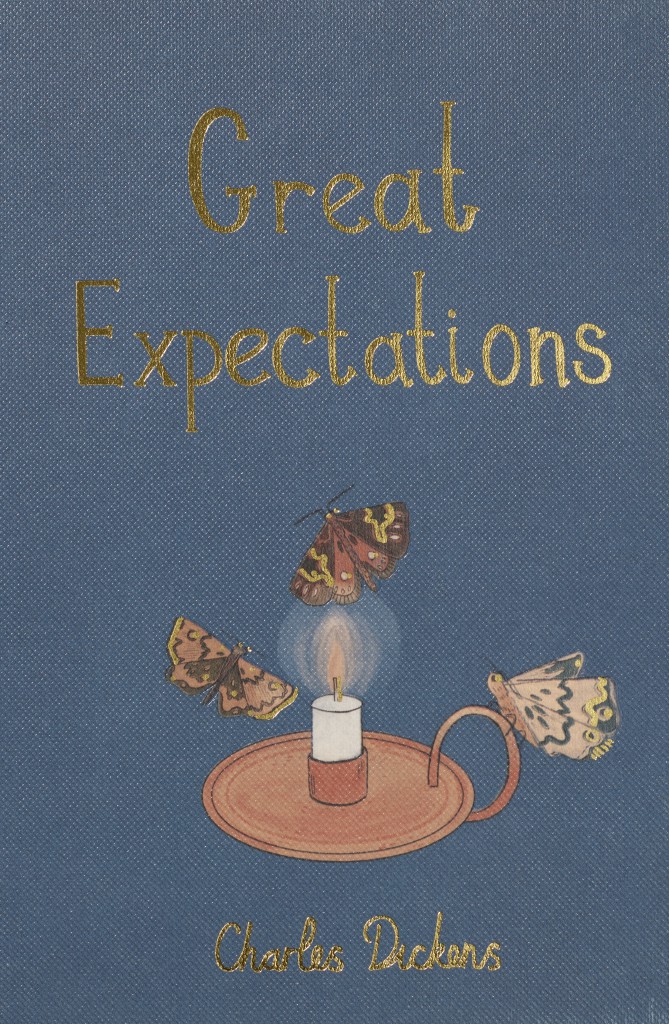
Great Expectations (Collector’s Edition)
Charles Dickens
